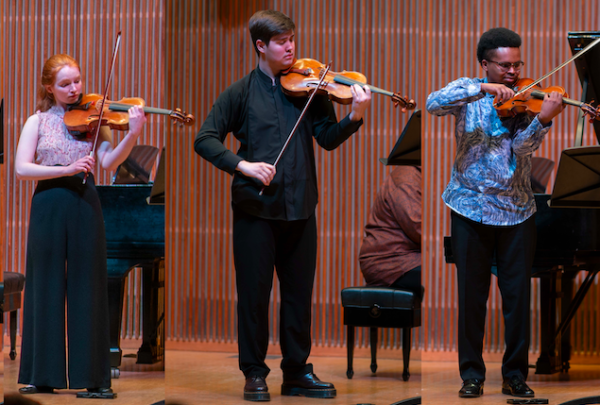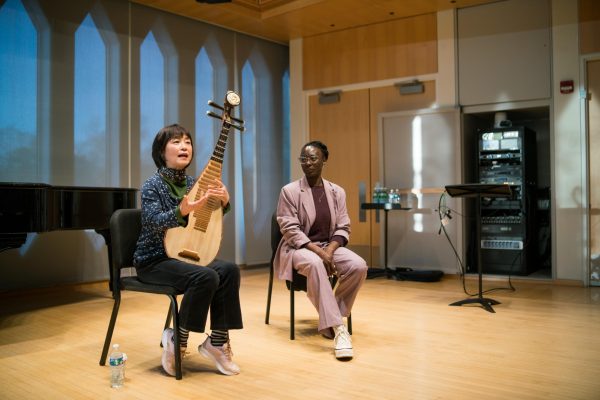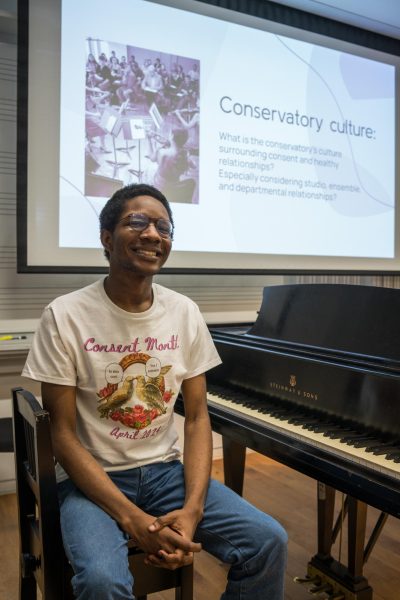Orchestra, Choir to Perform at Carnegie Hall this December
The Oberlin Conservatory Orchestra, along with a number of Oberlin choirs, will be heading to New York City’s Carnegie Hall twice in the upcoming months. On Dec. 2, they will perform three selections — Beethoven’s “Ninth Symphony,” Rachmaninoff’s “Piano Concerto No. 2,” and Adolphus Hailstork’s “Fanfare on Amazing Grace”— for a closed audience of U.N. General Assembly members.
On Jan. 20, during Winter Term, Oberlin’s choirs and orchestra will play a concert for a general audience at Carnegie Hall. This program will feature Robert Nathaniel Dett’s oratorio “The Ordering of Moses,” Iván Enrique Rodríguez’s Metaphor for Power,” and Brahms’ “Tragic Overture.” Students from the Oberlin Gospel Choir, Oberlin College Choir, Oberlin Musical Union, and Conservatory voice students will be performing.
Dett’s 1932 oratorio “The Ordering of Moses” the biblical story of Moses being called by God to liberate his people, the Israelites, from slavery in Egypt as a metaphor for the plight of Black Americans. Composed for his senior thesis at the Eastman School of Music in 1932, Dett’s work combines the classical elements of composers like Beethoven and Handel, but also the work of Black musicians, including his grandmother, who inspired his incorporation of Black spirituals in the composition.
The Conservatory’s U.N. performance is an extension of a joint collaboration between Oberlin College and Conservatory, the United Nations Institute for Training and Research, and the Global Foundation for the Performing Arts. The collaboration will use the theme of joy as a unifying message for the U.N. performance.
Brass students took part in auditions for the second Carnegie Hall tour during the spring semester, which were then used to determine their placement. For string players, the auditions were conducted Sept. 10.
The Conservatory originally announced that they would inform students of their inclusion in the Carnegie Hall tour on Sept. 19, but ultimately delayed until Sept. 29, Students are also unsure as to why there are discrepancies between the rosters for the U.N. and the rosters for the general audience.
Evan Beechy, a second-year Conservatory trombonist, was concerned that the process would give the wrong impression for students who were not selected.
“It’s really good for me because I have very little experience playing in really big halls and doing really cool things with an orchestra, but it’s kind of bittersweet, because a lot of the other people that didn’t get to go — it doesn’t mean they’re bad musicians,” Beechy said. “Like, we’re all going here, this is a great school, we’re all good at what we do, but it’s almost alienating those who didn’t get to go. The entire chorus gets to go twice, but other sections really only get to go once. I’m glad I’m going, but it’s really a weird situation.”
However, Beechey’s thoughts were not universally shared among his Conservatory peers. For second-year Conservatory cellist Michael Bridges, the chance to perform at Carnegie Hall is really exciting.
“I’ve heard from my friends that the music is quite hard, but I’m still so excited to just have the opportunity to go to New York City and play in that beautiful hall,” Bridges said.
President Carmen Twillie Ambar addressed the orchestra and choir during the campus-wide power outage on Monday evening, where she implored them to remember the unique position they are in. Previously, the U.N. has mostly only hired professional orchestras, so the inclusion of Oberlin in the U.N. program represents a departure from precedent.
Planning both of these trips has not been without challenges. Because the first trip will take place during the semester, the Oberlin Conservatory administration has had to carefully plan how exactly they will carry out this mission.
“It happens, of course, during the regular semester, which creates a lot of logistical issues because … classes are going on,” Conservatory Orchestral Conductor Raphael Jimenez said. “We need to make this happen around everything going on — classes and lessons.”
Yet the importance of the performances has not been lost on Jímenez.
“What I am the most excited about is that both programs give us the opportunity to address some of the most wonderful desires and rights for people — the right to freedom and the right to be happy,” Jimenez said.
Students hoping to hear pieces from the Winter Term performance can tune in Oct. 13 at 7:30 p.m. for a concert in Finney Chapel, which will also be live streamed through Oberlin Conservatory Productions.




